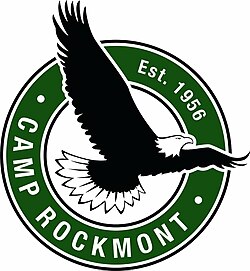 Strength and Gentleness, Force and Refinement, Mastery of Body, Servitude to God | |
| Location | Black Mountain, NC |
|---|---|
| Established | 1956 |
| Coordinating Director | Austin Ashcraft |
| Associate Director | Daniel Weatherby |
| Program Director | Justin Bennett |
| Assistant Director | Elias Longenecker |
| Website | www |
Camp Rockmont for Boys is an American Camp Association accredited Christian residential boys' summer camp in Black Mountain, North Carolina. Rockmont was founded in 1956 on the former campus of Black Mountain College. [1] [2] There are four "classic" sessions held each summer (13 days), as well as a one week starter session. Within the classic sessions are a three and four week option for more experienced campers. [3] Capacity for each session is about 400 boys, with each session varying slightly depending on enrollment.
